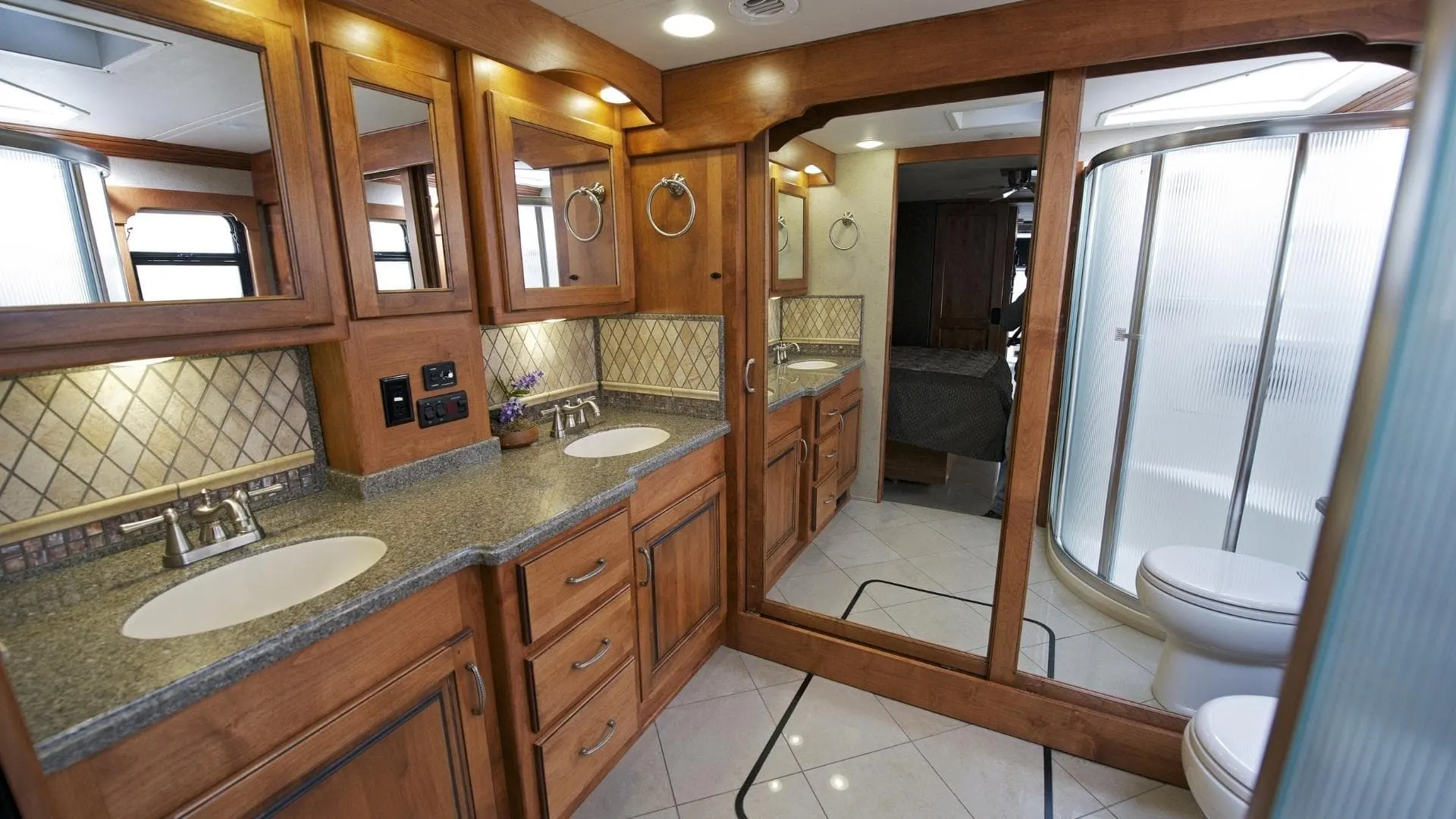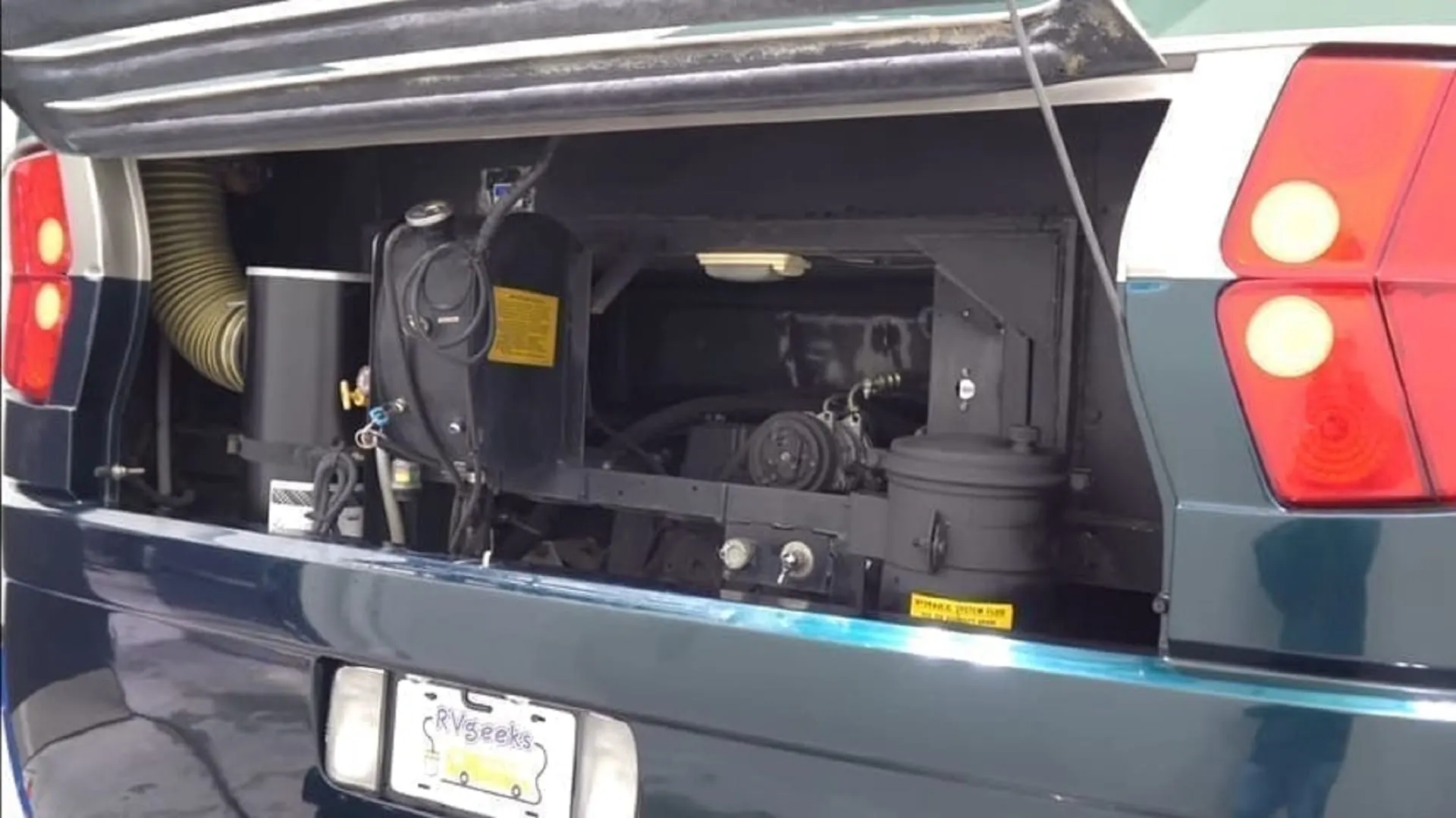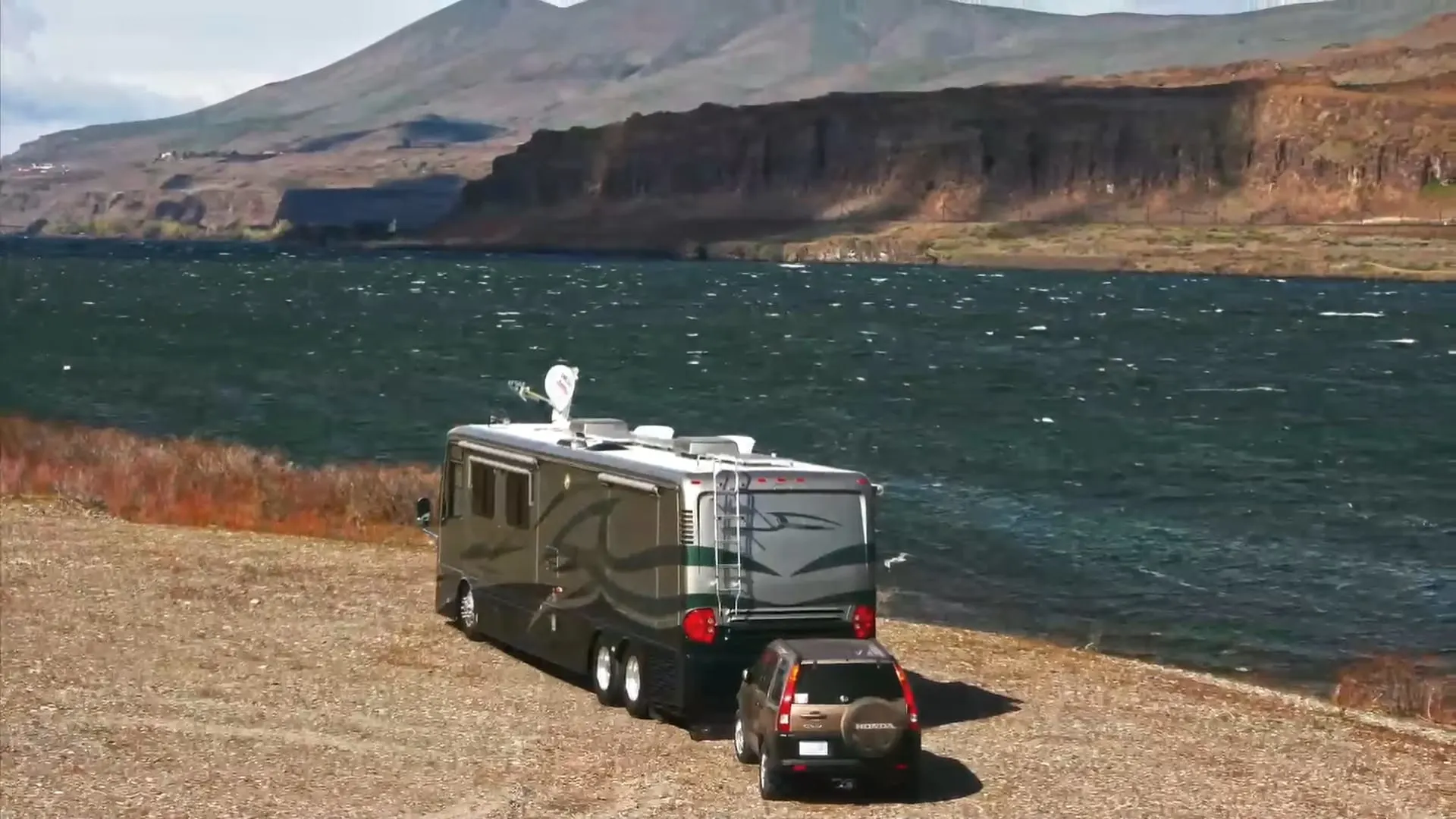You may be generally familiar with a Class A RV. But a diesel pusher motorhome, despite being classified as a Class A RV, is somewhat of a different beast compared to a gas Class A.
So, what exactly is a diesel pusher motorhome, and what are the advantages and disadvantages associated with it? Stay tuned, because we’re about to jump into the weeds to ferret out whether a diesel pusher just may – or may not – be the right choice of RV for you!
- 1) What Is a Diesel Pusher Motorhome?
-
2)
9 Signs a Diesel Pusher Motorhome Is Right For You
- 2.1) You’re Looking For Longevity/Durability
- 2.2) You Plan to Be Full-Time RVers
- 2.3) You Enjoy High-End Features and a Finely Appointed Home
- 2.4) You Enjoy the Smooth, Quiet Ride that a Diesel Pusher Motorhome Can Offer
- 2.5) You Appreciate a Powerful and Well-Built RV
- 2.6) You Desire Lots of Space
- 2.7) You Want Efficiency with Decent Fuel Economy
- 2.8) Less Frequent Maintenance
- 2.9) A Diesel Pusher Motorhome Can Tow More Weight
- 2.10) More Torque
- 2.11) Better Braking & Air-Ride Suspension
- 3) Would a Diesel Pusher Motorhome Be Right For You?
What Is a Diesel Pusher Motorhome?
A diesel pusher is a rear-engined diesel Class A motorhome. The name “pusher” comes from the fact that the diesel-powered engine in the rear of the rig essentially pushes the RV down the road, (as opposed to pulling it, as a front engine might be seen as doing).
Diesel Class A rigs are typically larger, heavier, and longer, and often come with more luxurious amenities than their gasoline Class A counterparts.

Class A diesel pusher motorhomes are usually larger, heavier, and longer, allowing them to include more high-end amenities.
9 Signs a Diesel Pusher Motorhome Is Right For You
So, why might you be interested in a diesel pusher motorhome? There are a number of reasons to love a diesel pusher. Having traveled, lived, and worked in one full-time for the past couple of decades, we’re just the guys to lay them out for you.
You’re Looking For Longevity/Durability
Diesel engines are built to last significantly longer than their gas-powered counterparts. This is because a diesel engine has higher compression ratios (and thus a thicker, sturdier engine block), a more efficient burn rate, and lubricating properties that historically have succeeded in improving their longevity and durability.
For this reason (and others), diesel engines have long been used in heavy-duty truck applications as well. It’s not unheard of for diesel engines to continue operating with 100s of thousands of miles on them!
You Plan to Be Full-Time RVers
If you plan to not only travel but live and work full time in your RV, a diesel pusher just might be for you. The combination of the high level of comfort, luxury amenities, a vast amount of space compared with many other RVs, and increased towing capacity make a diesel pusher a great home for full-timers.

When you live and work in your RV full-time, having a lot of space, comfortably appointed, is important.
Diesel pushers also tend to be more expensive, but full-timers may be less put off by the steep entry price since they can use the money from selling their sticks & bricks home to purchase their new luxury home-on-wheels.
You Enjoy High-End Features and a Finely Appointed Home
Along with the greater expense comes a highly luxurious RV. Class A diesel pushers frequently offer the best the RV industry has to offer. From appliances like washers & dryers, dishwashers, and residential refrigerators, to high-end solid wood cabinetry, solid surface or even granite countertops, tile (often HEATED) flooring, fixtures, and furniture, diesel pushers are usually swimming in luxury.
With the diesel pusher’s ability to carry a whole lot of weight, RV manufacturers have fewer limitations and spare no expense in these big rigs.
Goodness knows we certainly appreciate the high-end amenities and appliances in our diesel pusher, including the ability to have a washer & dryer, dishwasher, and RV residential refrigerator on board.
Of course, our 2005 diesel pusher didn’t come with this behemoth of a residential fridge – we had to do a little dancing to get it in here. But the point remains that there’s plenty of room for it onboard… and our big RV is perfectly capable of carrying the additional weight as well.
If you’re the anxious type, don’t watch this:
You Enjoy the Smooth, Quiet Ride that a Diesel Pusher Motorhome Can Offer
If you like a smooth, quiet, luxurious ride, you’ll love a Class A diesel pusher.
The smooth ride is supported by the substantial airbag suspension system and the quiet ride comes courtesy of the fact that the engine is located at the rear of the coach. As such, driving long distances is both comfortable and enjoyable.
As a bonus, diesel RVs also have diesel generators that are quieter and more efficient than gas generators, allowing you to power your off-grid explorations with a bit more peace (and for a lot longer)
You Appreciate a Powerful and Well-Built RV
If you appreciate heavy-duty power in a well-built RV, you’d love a diesel pusher.
We’re not suggesting that gas-powered motorhomes lack power. In fact, they can be sufficiently powerful, but in a different way than diesel-powered motorhomes.
The powertrain of our diesel pusher has an 8.9-liter 400HP Cummins ISL engine paired with an Allison 3000MH 6-speed transmission. The engine’s 1,200 lb-ft of torque pulls like a team of draft horses, holds a decent speed up long steep grades, and will cruise easily at highway speeds for vast distances.

The powertrain of our diesel pusher has an 8.9-liter 400HP Cummins ISL engine paired with an Allison 3000MH 6-speed transmission.
The higher purchase price of diesel pusher motorhomes often means that the manufacturers have more ability to use higher-quality parts, supplies, appliances, and manufacturing techniques. These upgrades can mean that your Class A diesel pusher motorhome can better withstand the bumps and vibrations that accompany life on the road, lending to that more solid, well-built feel… and fewer things to fix/repair!
You Desire Lots of Space
Because a diesel pusher can handle more weight, these motorhomes tend to have significantly more interior living space and storage space.
In fact, diesel RVs have more exterior storage space in the bays along the bottom of the coach than you can imagine. Even though we carry pretty much everything we own along with us, we’ve got ample room to store everything. This is because diesel rigs are typically built on a raised-rail chassis, allowing for plenty of basement storage that spans the entire width of the RV, (also known as “pass-through storage”). Lots of gear of pretty much any size can be stored, carried, and easily accessed.
In fact, with a little organization, it’s absolutely amazing how well we can pack our basement storage compartments:
You Want Efficiency with Decent Fuel Economy
The typical fuel economy of a Class A motorhome certainly isn’t the thing that draws most people to a Class A.
However, diesel fuel contains about 10-15% more energy than gasoline and burns much more efficiently. For this reason, a diesel pusher can travel roughly 20-30% further on a gallon of fuel than an equivalently-sized and powered gasoline RV can.
We get, on average, 7 mpg even though we’re fully loaded for full-time living (our RV’s gross weight is roughly 39,000 pounds) and tow our Honda CR-V four-wheels down.
With a 150-gallon fuel tank, we can cover as much as 950–1,000 miles before needing to stop and refuel.
Less Frequent Maintenance
In general, diesel engines require less frequent routine maintenance than gasoline engines do. Of course, as an RVer who may not travel all that far in a year, it’s quite common to reach the time interval for maintenance before you reach the mileage interval.
Though maintenance and repairs on diesel engines are usually more expensive, these engines generally require fewer repairs. Diesel engines are tough and durable, another reason why they’re used regularly in trucking applications.
A Diesel Pusher Motorhome Can Tow More Weight
Diesel engines and diesel motorhome chassis can tow more weight than gas-powered motorhomes. The towing capacity of a Class A diesel pusher is generally between 10,000 and 20,000 pounds. A Class A rig with a gasoline engine is usually limited to an average of 6,000 to 8,000 pounds, with some heavier rigs as high as 10,000 pounds.

We’ve been towing our SUV behind our diesel pusher motorhome for nearly two decades.
This can be important if you’re thinking of towing more than just a car behind your RV. (We flat tow a Honda CR-V because we enjoy the ability to go off the beaten path, but there are many other vehicles to tow behind an RV to maximize exploration.) Many people want to tow a large utility trailer (for additional storage or to bring a valuable car, etc) behind their motorhome that can quickly exceed the weight of a typical towed car, so having that extra towing capacity can be important.
More Torque
Torque, (essentially “pulling power”), is a measure of an engine’s rotational force. Diesel engines produce more torque than gasoline engines do.
This can be especially helpful when driving in the mountains, handling the weight of heavy, luxury appliances & amenities, and towing a vehicle, without being forced to slow down excessively. For example, since we’re full-time, our motorhome is pretty well loaded to the gills (fully loaded, our RV weighs about 39,000 pounds!). But because of the 1,200 lb-ft of torque our 400HP Cummins ISL diesel engine provides, we can easily maintain speeds on most mountain roads, only being slowed down on the very steepest of them.
Better Braking & Air-Ride Suspension
Again, diesel motorhomes offer a much smoother ride due to their air suspension and have immense stopping power due to their air braking.
You’ll have a much smoother ride when it comes to suspension and braking in a diesel rig than you will in a gasoline-powered motorhome.
Would a Diesel Pusher Motorhome Be Right For You?
While we do understand that they’re not the best choice for everyone, we love our Class A diesel pusher. We’ve been in the same one for 17 straight years now, after spending our first 2 years on the road in a Fleetwood Bounder Diesel (pusher)!
As nothing’s perfect, there are of course some drawbacks. For instance, you really do need to take along a “toad” (towed car) to explore cities and the backcountry if you enjoy doing those things as we do.
Also, due to their increased size, big rigs aren’t the easiest RV to drive on narrow roads or tight urban areas, and depending on where you’re headed, you may have to do some extra research to find big rig RV parks.
But the single biggest reason a Class A diesel pusher motorhome may not be the right choice for you is the additional cost to purchase them. Their higher price may mean that they’re outside of your budget.
But, they may also be more RV than you need. Which is fine… it’s why there are so many choices in RVs on the market. Even though a diesel pusher isn’t right for you, there are also some small Class A rigs like these 5 small Class A motorhomes that are smaller in size but still big on style.
There are LOTS of options to choose from out there!
Geek Out with Us Every Week
Join our newsletter to learn about all things RV-related. Every week we offer free tips, tricks, product reviews, and more to our online community of RVers. So, whether this is your first time on the road or you’re a seasoned expert, we’d love for you to geek out with us!


Gay Tacoma (Washington) Travel Enthusiast (Jason)
Thursday 4th of April 2024
I'd be happy driving a 30' long diesel pusher.
RichardM
Thursday 4th of April 2024
We picked up an older (2005) DP for many of the same reasons. We have had some serious repairs done all with the engine and chassis. Very few issues with the motorhome itself. Hopefully, the new engine is the end of our major problems.
Another good article.
Dan Guyor
Wednesday 5th of April 2023
My bride and I are looking to upgrade from our '21 Bounder (gas) to a pusher, but not for any of the reasons you listed in this article. Our reason is that at 36 ft with a toad I need to plan out every gas stop. It's usually at a Pilot/Flying J's RV lanes but there a few others I can use without worrying about taking out gas pumps or cars trying to maneuver in tight quarters. They are few and far between as most travel stops put the pump lanes perpendicular to the building.
The unspoken advantage of the diesel is that every truck stop is designed to handle larger vehicles. Pull in, pull up, pull out. That will give us the freedom of moving off our planned route without having to worry about finding a motorhome-friendly fuel pump.
TheRVgeeks
Wednesday 5th of April 2023
Interesting, Dan! We know what you mean about the RV lanes at Pilot/Flying J (and other truck stops). They can be QUITE tight for larger RVs (and the propane fill and dump stations can be hard to get to, too). If you're happy with your Bounder otherwise, you might want to just try fueling up at other stations. We use Google Maps (satellite view AND street view) to scope out non-truck-stop gas stations in advance. You'd be amazed at how much you can see... and we can plan our entrance and exit in advance, so we know that we can get in and out with our 43' motorhome towing our CR-V.
Neal Davis
Tuesday 5th of April 2022
Our first RV was a DP because I wanted a macho RV. ???????????? We also could afford it. I admire your collective patience with your 400 HP 8.9L Cummins. I get so bent out of shaped with our 450 HP 8.9L Cummins while climbing hills, and we tend to only be about 38,000 lbs. Looking forward to the new "sports car" (2022 New Aire 3545), which also has the 450 HP 8.9L Cummins and lower weight. Doubt it will go vroom, vroom, ???? but maybe it'll hold its speed ascending better. Have a great day! ????
TheRVgeeks
Tuesday 5th of April 2022
Hi Neal! Having spent years driving some pretty powerful MCI tour buses with turbocharged Detroit Diesels, you'd think I'd be unhappy with our rig's power. But it's surprisingly good in the mountains. Our 1,200 lb-ft of torque seems to do the job. We happen to weight almost exactly the same as you - 19 tons, plus towing our 3,500-ish lb CR-V. We can't necessarily maintain 60 MPH (my typical preferred cruising speed on the highway) going up really steep mountains. But we're always passing big trucks on the way up without a problem, and never get slowed down anywhere near the point of needing to turn hazard lights on. Now accelerating up the worst of those inclines isn't so easy sometimes, but maintaining a pretty satisfying speed isn't usually an issue. That said, bring on the New Aires! ????
Gay Tacoma Washington
Tuesday 5th of April 2022
While I'd love to have a diesel pusher motorhome, I'm not sure I'd want one that's 40' in length, 20' tall, and weighs 100k. Given how much diesel fuel is these days, the larger the RV, the more it costs to fuel.
TheRVgeeks
Tuesday 5th of April 2022
Diesel and regular gas aren't too far off in price in many places (diesel is actually cheaper in some areas), and large diesel RVs usually get better fuel mileage than large gas RVs. But it's definitely the "large" part that's the problem! LOL